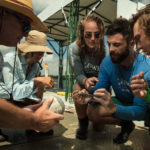UWF students getting their hands on history
On land or underwater, the University of West Florida is making sure that its Anthropology and Archaeology students are getting hands-on experience participating in summer maritime and terrestrial field schools. Considered the "heart" of the archaeology program, the field schools are offered each summer term, also with an option for undergraduate students to combine maritime and terrestrial field schools.
On land or underwater, the University of West Florida is making sure that its Anthropology and Archaeology students are getting hands-on experience participating in summer maritime and terrestrial field schools. Considered the “heart” of the archaeology program, the field schools are offered each summer term, also with an option for undergraduate students to combine maritime and terrestrial field schools.
“I was told that if I wanted to do any archaeology in the Southeast, that the best place to get the experience was at UWF,” said Jessica Clover, senior at the University of Central Florida and UWF terrestrial field school student.
Excavating by the Barkley House in Pensacola, one of the oldest masonry residences in Florida, the UWF terrestrial field school is working to preserve and analyze evidence of the former kitchen and cook’s house. Students are receiving the opportunity to work on this project before the Florida Historical Preservation rebuilds the structures on their former foundations.
“We really believe that the hands-on experience is what allows students to become real archaeologists,” said Elizabeth Benchley, director of the UWF Archaeology Institute. “It’s an essential part of an undergraduate curriculum and students get a chance to see like an archaeologist and read the dirt.”
Giving students the opportunity to learn the basic skills of archaeological excavation and field laboratory methods, archaeologists and graduate students are on site full time to teach and assist undergraduate students. From handling a survey instrument to excavating units or organizing and tracking recovered material, terrestrial and maritime students work constantly Monday through Friday from late-May to mid-August.
“Our maritime field school has grown and expanded in the past few years,” said Greg Cook, UWF research associate and maritime archaeologist. “We really try to train people to do underwater archeology and dive safely and become underwater scientists, while also getting work done on the 1559 shipwreck.”
Located on a barge in Pensacola bay, the maritime field school sits above the remnants of a 450-year-old shipwreck, one of Tristan de Luna’s ships from his 1559 Pensacola colonization fleet. Discovered by two UWF students in 2006, archaeologists and students continue to excavate the site and are finding new materials every day.
“We get to work on one of the most significant sites that America has to offer right now,” said Tiffany Goldhamer, graduate student. “I feel very lucky to get the opportunity to be a part of a program that is very big on involving the public in archaeology.”
Diving down in groups of three, surveying a one meter by one meter area, each student has a key role, whether it’s measuring line levels or hand fanning sediments, they alternate between two teams and share information to make sure materials get properly tracked.
“We’re starting to get past some of the ballast and yesterday we started to feel pieces of wood,” said Brian Durnan, undergraduate student. “It’s exciting because that could be the mast or another part of the ship. To be able to touch history is indescribable.”
For more information, contact Benchley at (850) 474-3015 or e-mail ebenchle@uwf.edu or Cook at (850) 474-3015 or e-mail gcook1@uwf.edu. To find out more about UWF Anthropology and Archaeology, visit uwf.edu/anthropology. To read project journals about the maritime field school, visit uri.edu/mua.
By Megan Tyson, University Marketing Communications


